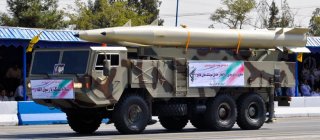Leave Ballistic Missiles Out of the Iran Deal
A sensitive issue at a time when negotiations could heat up.
Despite the positive atmosphere, the latest round of nuclear negotiations between Iran and the P5+1 did not result in a final agreement. Various sources reveal that one of the main obstacles preventing a final deal was Western countries' insistence—and Iran's refusal—to place Iran’s ballistic missiles program on the discussion agenda.
From a legal standpoint, the United States argues that Security Council resolution 1929 prohibits activities related to Iran's ballistic missiles capable of delivering nuclear weapons. Therefore, it contends, since the Geneva's Joint Plan of Action (JPOA) talks of "addressing Security Council resolutions," the issue of Iran's ballistic missiles should also fall into the topics under discussion. Iran refuses this interpretation of the JPOA, claiming that its military capabilities constitute a sovereign right that is unrelated to the nuclear dossier.
As we approach the next round of negotiations, three points are worth highlighting with regard to the U.S. legal position:
First, the Joint Plan of Action does indeed talk about the need of "addressing Security Council resolutions." However it does so adding: "with a view toward bringing to a satisfactory conclusion the UN Security Council's consideration of this matter." It also says that a "comprehensive solution would involve a reciprocal, step-by- step process, and would produce the comprehensive lifting of all UN Security Council sanctions."
Therefore, according to the JPOA, if parties are to address UNSC sanctions—which include the sanction on Iran's ballistic missiles activities—they should do so solely with the view of comprehensively lifting them, not to discuss the modalities of actually maintaining them, as the United States seems to expect.
In other words, in the course of the negotiations, the P5+1 can offer to lift the prohibition on Iran's ballistic missiles activities in exchange for Iran's nuclear concessions; But it cannot expect Iran to fully or partially concede to the prohibition itself. Doing so would mean that parties will neither reach a "comprehensive lifting of all UN Security Council sanctions", nor would they succeed in "bringing to a satisfactory conclusion the UNSC considerations of the matter", as the text of the JPOA clearly prescribes.
Any other interpretation of this provision would imply that the JPOA actually intends to have the negotiating parties turn a punitive measure by the Security Council into a permanent binding commitment; something that defies common sense.
Secondly, the JPOA views the prohibition on ballistic missiles as a "sanction" on par with all other sanctions imposed throughout the years on Iran's various sectors of activity (oil, petrochemicals, finances, etc.). And at no point does the text confer this sanction provision a special status that would exempt it from being "comprehensively lifted" at the conclusion of the negotiations. (The JPOA expects " the comprehensive lifting of all UN Security Council sanctions").
In other words, from a legal perspective, there is nothing exceptional about this particular UNSC sanction that would justify discussing it for any purpose other than to completely rescind it. Those who single out this particular UNSC sanction in view of discussing ways to maintain it have yet to come up with a legal ground to justify their position because neither the Security Council resolutions, nor the Joint Plan of Action confer a special status to this particular prohibition.
Finally, on a practical note, the U.S position raises this question: Why insist on addressing the issue of ballistic missiles when the underlying source of concern (i.e Iran's nuclear capabilities) is itself already the central point of discussion—and on its way to being resolved? After all, a fair reading of Resolution 1929, viewed in light of its object and purpose, reveals that the Security Council does not actually address Iran's ballistic missiles activities on their own but rather prohibits activities related to "ballistic missiles capable of delivering nuclear weapons."
So without nuclear weapons in the picture—or without a program that could potentially produce nuclear weapons—(which is the expected outcome of the negotiations), the prohibition is automatically rendered irrelevant. Therefore, discussing it in violation of the JPOA—and without the consent of one of the parties—seems fruitless and counterproductive more than anything else.
Reza Nasri is an international lawyer from Geneva's Graduate Institute of International and Development Studies, specializing in Charter law.
Image: Wikimedia Commons/M-ATF/CC by-sa 3.0

